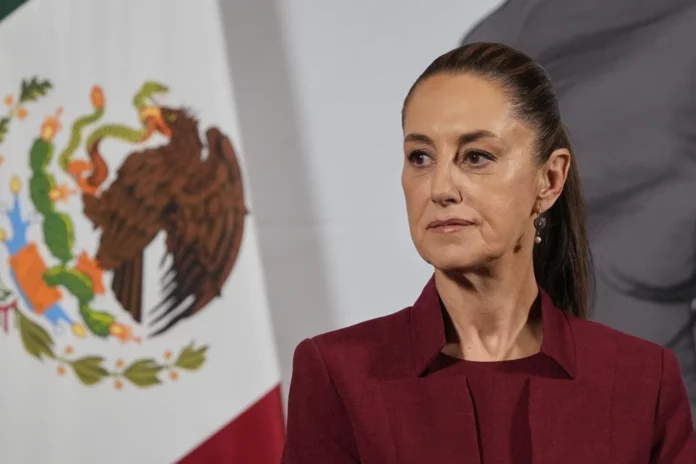
Borderline Realities, Sovereignty on Trial, and the Bukele Blueprint
- Mexico’s President Claudia Sheinbaum rebuffed former President Trump’s proposal to send U.S. military forces across the border to target drug cartels—insisting on sovereignty, despite record cartel violence.
- Trump’s designation of cartels as foreign terrorist organizations has ramped up U.S. troop deployments and surveillance along the southern border, stoking calls for unilateral U.S. action inside Mexico.
- El Salvador’s President Nayib Bukele blasted Mexico’s leadership as ineffective and claimed his administration has achieved what Mexico has failed to do: liberate a nation from terror.
By Samuel Lopez – USA Herald
MEXICO CITY— A political firestorm ignited this weekend after Mexican President Claudia Sheinbaum publicly confirmed that she rejected a proposal from U.S. President Donald Trump to send American troops into Mexico to help dismantle the drug cartels fueling an international crisis of fentanyl trafficking, human smuggling, and organized crime.
“He said, ‘How can we help you fight drug trafficking? I propose that the United States military come in and help you.’ And you know what I said to him? ‘No, President Trump,’” Sheinbaum told a crowd in eastern Mexico.
“Sovereignty is not for sale. Sovereignty is loved and defended,” she declared.
“We can work together, but you in your territory and us in ours,” Sheinbaum said.
But in Washington and beyond, many are calling these statements delusional—and dangerous.
Critics argue that Sheinbaum’s government isn’t truly defending sovereignty, but shielding a power structure infiltrated by the very cartels Trump aimed to neutralize. Analysts say cartel influence has crept so deeply into Mexican governance that refusal to cooperate with the U.S. amounts to enabling the enemy.
“The Mexican government no longer serves the Mexican people—it serves the cartels,” one senior intelligence analyst told USA Herald under condition of anonymity. “Trump’s offer wasn’t an invasion. It was an intervention.”
Trump’s War Footing at the Border
Following a January directive from Trump, the U.S. Northern Command has surged troops and equipment to the border. Surveillance flights now routinely monitor drug corridors, and Special Forces are preparing for deeper collaboration with any willing Mexican counterparts.
On February 19, Trump officially designated several cartels as foreign terrorist organizations—a move that not only expands federal enforcement authority, but potentially paves the way for cross-border operations under counterterrorism justifications.
Sheinbaum’s rejection now places her in direct opposition to the U.S. plan, even as fentanyl overdoses continue to devastate American communities and human trafficking networks exploit weak southern defenses.
The El Salvador Model: Bukele’s Blistering Critique
Enter Nayib Bukele, President of El Salvador—and perhaps the hemisphere’s most vocal critic of Mexico’s handling of crime and migration.
“Mexico is not solving the problem,” Bukele said bluntly. “They’re outsourcing it—straight into the U.S.”
Bukele, whose own country once held the grim title of “murder capital of the world,” has gained praise (and criticism) for his iron-fisted policies that have led to the imprisonment of over 75,000 alleged gang members. He argues that real sovereignty means having a state stronger than the gangs it faces.
“You can’t talk about sovereignty if cartels rule your cities,” he told an international forum earlier this year.
The Salvadoran leader’s hardline approach, credited with drastically reducing homicides, has sparked admiration among American lawmakers who say the U.S. must stop playing nice with Mexico and start demanding results—or consequences.
Growing Calls for Tariffs, Sanctions, and Aid Cuts
Many in the U.S. policy arena say Sheinbaum’s rejection of U.S. military assistance should not go unanswered. From conservative think tanks to centrist lawmakers, the chorus is growing louder: cut foreign aid to Mexico, impose punitive tariffs, and tighten economic levers until the Mexican government prioritizes real security reform.
“Why are we funding a government that enables the flow of poison and trafficked children into our country?” asked one U.S. senator during a recent Homeland Security hearing.
Others want a direct strike at cartel finances—pressuring international banks, Mexican oligarchs, and corrupt politicians who profit from the chaos.
A Sovereignty Crisis—Or a Security Emergency?
Sheinbaum’s critics argue that her defiant posture is less about sovereignty and more about survival—political and perhaps personal.
“There’s a fine line between protecting your nation’s dignity and protecting criminal organizations,” – Samuel A. Lopez, legal analyst and journalist with USA Herald. “What we’re witnessing may be the collapse of the Mexican state’s ability—or willingness—to combat narco-terrorism without outside help.”
Indeed, as Mexican towns fall into the hands of rival cartels, and U.S. border cities brace for waves of smuggled drugs and desperate migrants, some believe we’re nearing the point of no return.
The question now: Will the U.S. act with or without Mexico’s permission?
Explore More
🔗 Follow us on X @RealUSAHerald
For more legal insights and deep-dive international reporting, join me on Patreon at Legal Insights and Strategies by Samuel Lopez Explore templates, legal breakdowns, and behind-the-scenes dossiers available exclusively to supporters.


